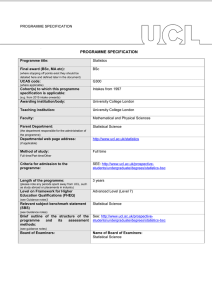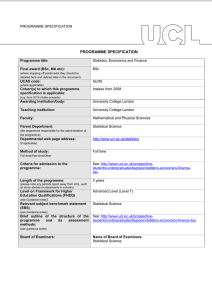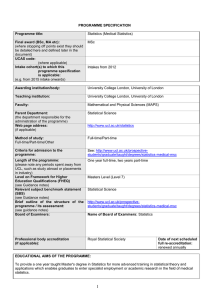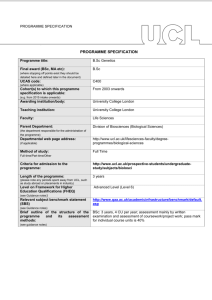PROGRAMME SPECIFICATION Programme title: Final award (BSc, MA etc):
advertisement
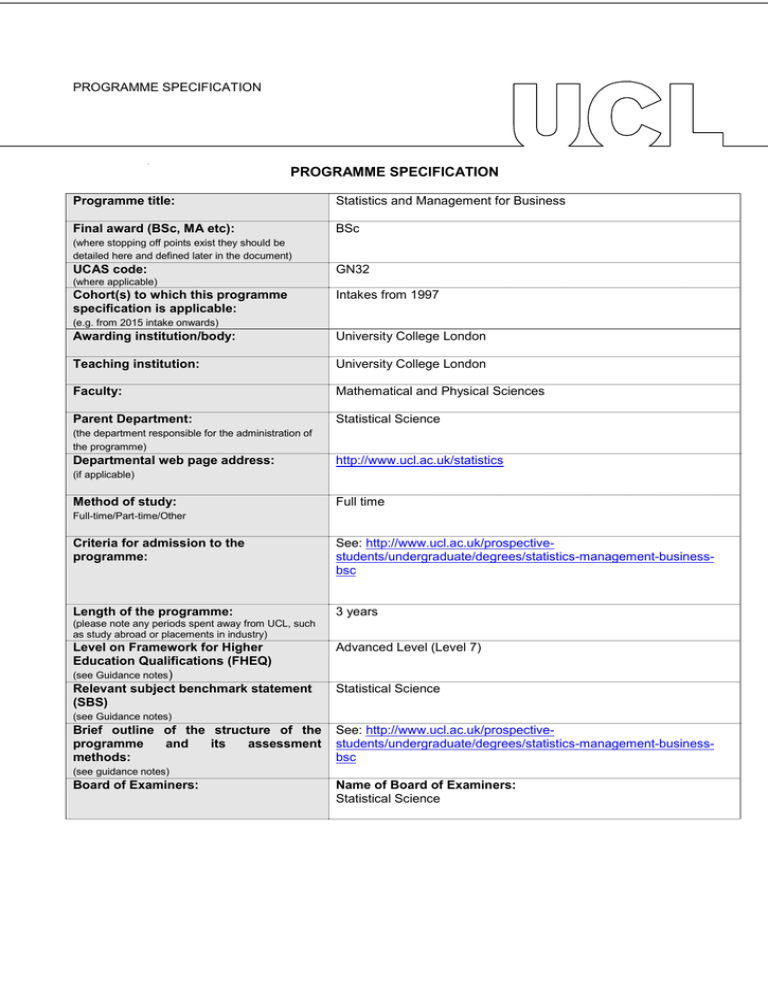
PROGRAMME SPECIFICATION PROGRAMME SPECIFICATION Programme title: Statistics and Management for Business Final award (BSc, MA etc): BSc (where stopping off points exist they should be detailed here and defined later in the document) UCAS code: GN32 (where applicable) Cohort(s) to which this programme specification is applicable: Intakes from 1997 (e.g. from 2015 intake onwards) Awarding institution/body: University College London Teaching institution: University College London Faculty: Mathematical and Physical Sciences Parent Department: Statistical Science (the department responsible for the administration of the programme) Departmental web page address: http://www.ucl.ac.uk/statistics (if applicable) Method of study: Full time Full-time/Part-time/Other Criteria for admission to the programme: See: http://www.ucl.ac.uk/prospectivestudents/undergraduate/degrees/statistics-management-businessbsc Length of the programme: 3 years (please note any periods spent away from UCL, such as study abroad or placements in industry) Level on Framework for Higher Education Qualifications (FHEQ) (see Guidance notes) Relevant subject benchmark statement (SBS) Advanced Level (Level 7) Statistical Science (see Guidance notes) Brief outline of the structure of the programme and its assessment methods: See: http://www.ucl.ac.uk/prospectivestudents/undergraduate/degrees/statistics-management-businessbsc (see guidance notes) Board of Examiners: Name of Board of Examiners: Statistical Science Professional body accreditation (if applicable): Royal Statistical Society Date of next scheduled accreditation visit: renewed annually EDUCATIONAL AIMS OF THE PROGRAMME: To provide an intellectually challenging undergraduate degree programme in the theory and practice of Statistical Science, and equip those students who wish to enter industry or commerce with sufficient management skills for the first few years at work. This training should enable students to proceed directly to posts as Statisticians in industry, commerce or public organisations, or by profiting from the general numeracy and reasoning skills acquired during the programme, to take up trainee positions in accountancy, insurance or management. The programme should also provide a preparation for a Master's programme in Statistics or Operational Research, which in turn is a normal requirement for postgraduate research in either of these areas. PROGRAMME OUTCOMES: The programme provides opportunities for students to develop and demonstrate knowledge and understanding, qualities, skills and other attributes in the following areas: A: Knowledge and understanding Knowledge and understanding of: 1. fundamental ideas of probability theory and applied probability; 2. appropriate methods of statistical inference, in a variety of standard situations and over a range of applied areas; 3. at least one major statistical computer package; 4. mathematical methods associated with 1 and 2 above; 5. basic deterministic and stochastic methods in operational research; 6. theoretical management concepts and their practical application. Teaching/learning methods and strategies: The primary method of communicating information to students and stimulating their interest is through lectures, which provide all students with a formal knowledge base from which their understanding can be developed. Understanding of lecture material is reinforced by assessed and non-assessed coursework, problem classes, workshops and group tutorials, as well as by self-study. Coursework includes problems designed to fix ideas. Peer-assisted learning, discussion with other students and individual discussion with staff also support the learning process. The degree programme does not assume any previous exposure to statistics or management studies. The first year is designed to provide all students with a firm foundation in statistics and management studies, while deepening the knowledge and understanding of those students with some previous exposure. The second and third years build on this foundation through further compulsory courses on core topics in probability theory and statistical inference, and in management studies. Specialist areas of application of statistics, such as in medicine and commerce, are mostly introduced as third year options. Assessment: For each course covering 1 to 6 opposite (excluding optional project courses), formal testing of the knowledge base is by a combination of written examination and in-course assessment. In-course assessment is designed to encourage students to develop their knowledge and skills as each course proceeds. B: Skills and other attributes Intellectual (thinking) skills: 1. explain and use basic concepts in probability theory; 2. recognise the structure of the data in a variety of standard situations and define the problem to be solved in statistical terms; 3. select and apply appropriate statistical methods, and interpret the results; 4. carry out a critical evaluation of an analytical method, recognising both its strengths and its limitations; 5. identify and discuss the impact of cultural, political, social, economic and technological issues on organisations; 6. present arguments and views which demonstrate understanding of the realities of organisation life. Teaching/learning methods and strategies: Whereas lectures provide the primary vehicle for accumulating a knowledge base, intellectual skills are mainly developed outside the lecture theatre for example, by tackling and discussing problems set on a regular (usually weekly) basis. Some coursework requires students to develop their thinking beyond rote learning, and to link ideas between different courses. Students are encouraged to reason openly through discussion of set problems in tutorials. For some courses, workshops allow students to work on problems individually or in groups, with teaching staff/assistants present to give help. Teaching staff also provide individual (one-to-one) feedback and assistance to students on request. Assessment: Although not all coursework contributes towards formal assessment, students are encouraged to demonstrate their intellectual skills in written responses to problem sheets and in oral responses during tutorials. Formal assessment of intellectual skills is through the compulsory components of assessment described in A. C: Skills and other attributes Practical skills (able to): 1. build suitable probability models in standard situations; 2. use appropriate statistical methods of data analysis; 3. interpret numerical information and results of statistical analyses; 4. present the results of an analysis in a clear and informative manner; 5. use a statistical computer package and interpret the output; 6. define, analyse and present recommendations for the solution of given management problems. Teaching/learning methods and strategies: Practical skills are developed by the provision of opportunities for hands-on experience through regular coursework, workshops and projects. In statistics, the range of problems set is designed to help students develop the practical skills required for basic statistical analyses. Skill 5 is an essential part of modern statistics and is taught in a compulsory first year course, and also plays a role in many projects. Assessment: Practical skills are assessed through inspection of coursework during a course (with feedback mainly presented through tutorials/problem classes/workshops, and on an individual basis on request), and also through the compulsory components of assessment described in A. D: Skills and other attributes Transferable skills (able to): 1. structure and communicate ideas effectively both orally and in writing; 2. interpret numerical information; 3. acquire a structured approach to problem solving; 4. work independently; 5. participate in group discussions; 6. assess the relevance and importance of the ideas of others; 7. find information and use information technology; 8. manage time and meet deadlines; 9. monitor progress by self-assessment. Teaching/learning methods and strategies: Skills 1, 2, 3, 5 and 6 are mainly developed through the problem sheets, workshops and tutorials, and also the optional project courses. Skill 4 arises from the requirement to be individually formally assessed. Skill 7 is developed through individual learning; IT skills are also acquired through management studies courses and optional computing courses. Although skill 8 is not formally taught, students are expected to meet deadlines, particularly for submission of assessed coursework. For skill 9, students are encouraged to monitor their own working practice using a selfassessment questionnaire available on the departmental website, and to monitor their own progress by selfmarking of non-assessed coursework. Assessment: Skills 1, 2 and 3 are formally assessed by in-course assessment and final written examination for each course. Skills 4, 6 and 7 are assessed though some management studies courses and are elements of assessment of optional third year statistical project work. Use of IT is also assessed in optional computing courses. Skills 5, 8 and 9 are not formally assessed. The following reference points were used in designing the programme: the Framework for Higher Education Qualifications (http://www.qaa.ac.uk/en/Publications/Documents/Framework-Higher-Education-Qualifications-08.pdf); the relevant Subject Benchmark Statements (http://www.qaa.ac.uk/assuring-standards-and-quality/the-qualitycode/subject-benchmark-statements); the programme specifications for UCL degree programmes in relevant subjects (where applicable); UCL teaching and learning policies; staff research. Please note: This specification provides a concise summary of the main features of the programme and the learning outcomes that a typical student might reasonably be expected to achieve and demonstrate if he/she takes full advantage of the learning opportunities that are provided. More detailed information on the learning outcomes, content and teaching, learning and assessment methods of each course unit/module can be found in the departmental course handbook. The accuracy of the information contained in this document is reviewed annually by UCL and may be checked by the Quality Assurance Agency. Programme Organiser(s) Dr Christian Hennig Name(s): Date of Production: November 2006 Date of Review: November 2014 Date approved by Head of Department: 18 November 2014 Date approved by Chair of Departmental Teaching Committee: Date approved by Faculty Teaching Committee 18 November 2014 February 2015
